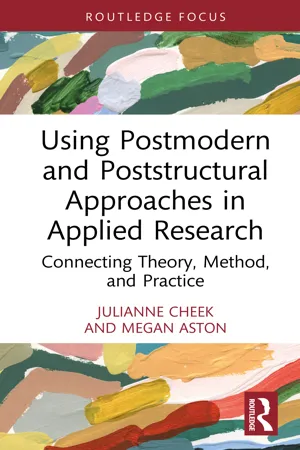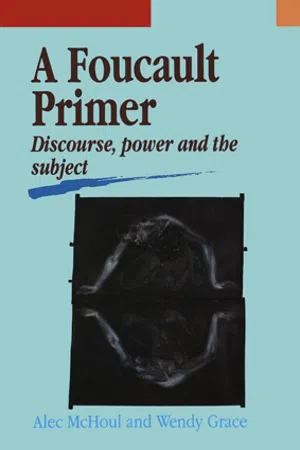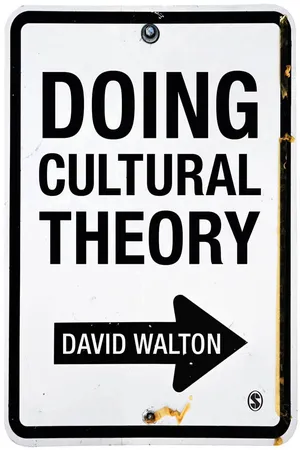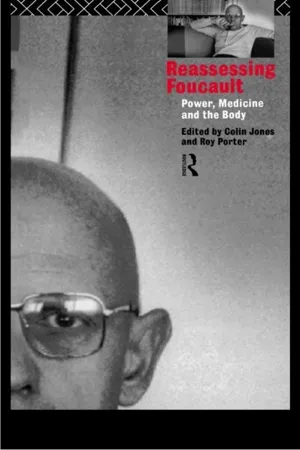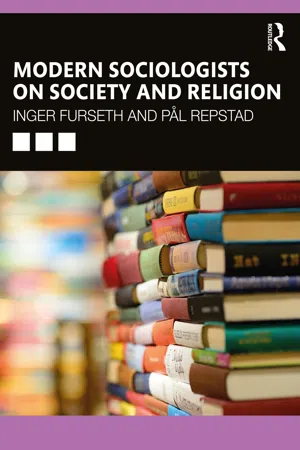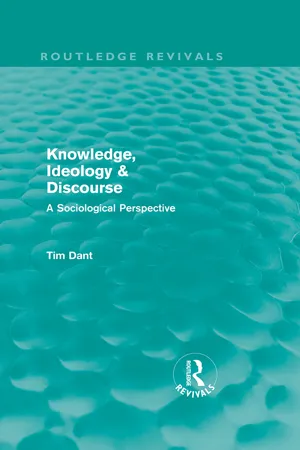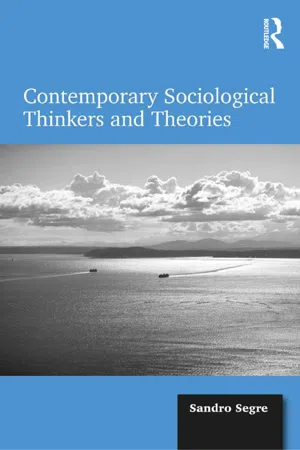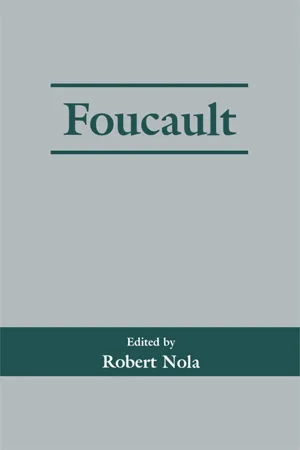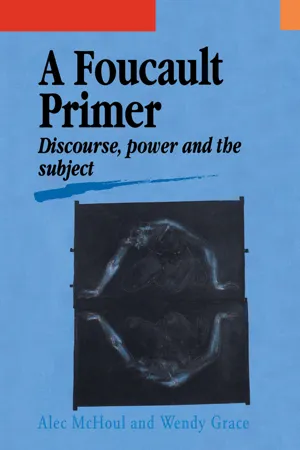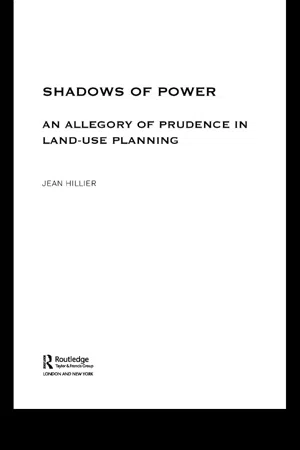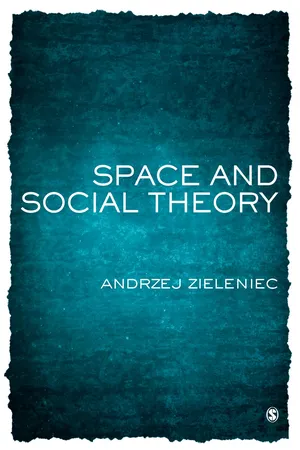Languages & Linguistics
Michel Foucault Discourse Theory
Michel Foucault's discourse theory examines the relationship between power, knowledge, and language. It focuses on how language shapes and constructs social reality, and how power operates through the control and regulation of discourse. Foucault's approach emphasizes the ways in which language and discourse are used to maintain and perpetuate power structures within society.
Written by Perlego with AI-assistance
Related key terms
Related key terms
1 of 4
Related key terms
1 of 3
12 Key excerpts on "Michel Foucault Discourse Theory"
- eBook - ePub
Using Postmodern and Poststructural Approaches in Applied Research
Connecting Theory, Method, and Practice
- Julianne Cheek, Megan Aston(Authors)
- 2024(Publication Date)
- Routledge(Publisher)
We will begin the exploration of Foucault’s work by focusing on his problematization of knowledge. In keeping with postmodern approaches, Foucault challenges notions which hold that knowledge is objective and value-free, inevitably progressive, and universal. He argues instead that knowledge is inextricably bound to power. Foucault explores the knowledge/power link through the concept of discourse. For Foucault “discourse” refers to ways of thinking and speaking about aspects of reality:A discourse provides a set of possible statements about a given area, and organizes and gives structure to the manner in which a particular topic, object, process is to be talked about.(Kress, 1985 , p. 7)Discourses create discursive frameworks which order reality in a certain way. They both enable and constrain the production of knowledge in that they allow for certain ways of thinking about reality whilst excluding others. In this way they determine who can speak, when, and with what authority, and conversely, who cannot (Ball, 1990 ). In analysing the effect of such discursive frames, Foucault asks, “what rules permit certain statements to be made; what rules order these statements; what rules permit us to identify some statements as true and some false; what rules allow for construction of a map, model, or classificatory system?” (Philp, 1985 , p. 69).It is important to recognize that at any point in time there are a number of possible discursive frames for thinking, writing and speaking about aspects of reality. However, not all discourses are afforded equal presence or, therefore, equal authority. At any time in history certain discourses will operate in such a way as to marginalize or even exclude others.Which discursive frame is afforded presence at any time is a consequence of the effect of power relations. “Discourses represent political interests and in consequence are constantly vying for status or power” (Weedon, 1987 , p. 41). Indeed Foucault (1984) - eBook - ePub
Feminist Poetics
Performance, Histories
- Terry Threadgold(Author)
- 2002(Publication Date)
- Routledge(Publisher)
Chapter 4
Discourse, expressibility and things to do with Foucault
‘Discourse’ is a term with a complex and heterogeneous history within semiotics and cultural theory. It is currently used in a variety of disciplines and interdisciplines to serve a number of disparate functions. In linguistics, and elsewhere, at a very general level, it means ‘language in use’ (parole), but there remains a large gulf between poststructuralist and linguistic modes of discourse analysis. The analyses of the particular instance of a linguistic or semiotic kind, which might establish the limits and interrelations between the enunciative and the discursive, have not been occurring in the poststructuralist work. And the kind of radical rethinking that this work has been doing has not, as Fairclough (1992a) shows, been generally taken up in the linguistic forms of discourse analysis. A recent editorial by Teun van Dijk in the journal Discourse and Society (van Dijk 1995), suggesting that poststructuralist forms of discourse analysis have no place in the journal, and the heated responses to it in a later issue, offer some indication that the divisions between these knowledges are still closely guarded in some quarters.FOUCAULT AND DISCOURSE
The term ‘discourse’ has come to carry a very different set of connotations and determinations since the work of Michel Foucault. That work, while it had a great deal to do with cultural and social formations, was in some senses specifically and intentionally not linguistic or semiotic. What Foucault’s work did was to insist on the controlling, positioning and productive capacities of signifying practices, denying in the process the primacy of signification itself and radically unsettling common theoretical assumptions about the ways in which signifying practices operated. His work also explicitly connected the discipline of the body, the production of knowledges and the making of subjectivity. - eBook - ePub
- Alec McHoul, Wendy Grace(Authors)
- 2013(Publication Date)
- Melbourne University Press Digital(Publisher)
2Discourse
T o look at how Foucault used the concept of discourse, we turn to those conceptual and methodological reflections on the historical ‘discourse analyses’ he had performed in his earlier works (1967, 1973), and especially the analyses in The Order of Things (1970). These reflections are to be found in The Archaeology of Knowledge (1972) particularly, but also in other texts of self-commentary (1971, 1978b).Foucault thinks of discourse (or discourses) in terms of bodies of knowledge. His use of the concept moves it away from something to do with language (in the sense of a linguistic system or grammar) and closer towards the concept of discipline. We use the word ‘discipline’ here in two senses: as referring to scholarly disciplines such as science, medicine, psychiatry, sociology and so on; and as referring to disciplinary institutions of social control such as the prison, the school, the hospital, the confessional and so on. Fundamentally, then, Foucault’s idea of discourse shows the historically specific relations between disciplines (defined as bodies of knowledge) and disciplinary practices (forms of social control and social possibility).This is very different from other (especially Anglo-American) conceptions of discourse. In order to clarify what discourse is for Foucault, we need to address the following three questions:- how has the term ‘discourse’ been used in the traditional (usually linguistic) disciplines?
- what was the basis, in Foucault’s earlier work (1970, 1972), for his complete reconceptualisation of the idea of discourse?
- what are some of the political possibilities opened up by this rethinking of the concept?
Non-Foucauldian conceptions of discourse
Foucault’s approach to discourse can be called a ‘critical’ approach, since it is geared towards a counter-reading of historical and social conditions and offers possibilities for social critique and renewal. This can rarely be said of the non-critical approaches stemming from linguistics, socio-linguistics and sociology (among other traditional disciplines). For the sake of exposition, let us separate these non-Foucauldian approaches into two groups: the formal and the empirical - eBook - ePub
- David Walton(Author)
- 2012(Publication Date)
- SAGE Publications Ltd(Publisher)
9
Discourse and Power
Michel Foucault
Learning goals- To see why Michel Foucault’s work has been associated with poststructuralist approaches.
- To understand the importance of discourses to Foucault’s ways of thinking culture and to appreciate how they systematically form the objects of which they speak.
- To grasp how reason, truth, knowledge and power interrelate in Foucault’s writings.
- To see how the discursive approach helps to illuminate Foucault’s ideas about history and gives insights into how he approached surveillance and modern constructions of sexuality.
ConceptsThe key concepts introduced in this chapter are: the critique of reason, knowledge, truth, power, discourse, anti-essentialism, self-regulation, surveillance, the Panopticon, genealogy and the history of sexuality.Introduction
This chapter will begin by discussing the status of Foucault’s contribution to cultural studies and go on to introduce Foucault’s ‘discursive’ approach to cultural analysis and his critique of reason. This will be followed by a discussion of how Foucault theorized the relationships between knowledge, truth and power and this will be illustrated with reference to his ideas on self-regulation, surveillance and control. The chapter will then return to the discursive side of Foucault’s work by exploring the idea of ‘man’ as a construction within the discourses of the sciences. This will serve as an introduction to Foucault’s theory of history, which will be developed through dominant themes which he elaborated in his history of sexuality. The general approach is to connect Foucault to writers already introduced and prepare the way for an understanding of how Judith Butler united Foucauldian approaches with those of other poststructuralist thinkers. - eBook - ePub
Reassessing Foucault
Power, Medicine and the Body
- Colin Jones, Roy Porter, Colin Jones, Roy Porter(Authors)
- 2002(Publication Date)
- Routledge(Publisher)
3 My discussion will be partly expository and partly critical, because Foucault’s work on discourse analysis is neither lucid nor uncontroversial. In fact, one of the consequences that could be drawn from my critique is that the current inflationary use of the term ‘discourse’ is unhelpful, to say the least; for the question needs to be raised whether the term ‘discourse’, though undeniably part of Foucault’s generally innovative work, designates a well-defined theoretical object.First of all, then I would like to demonstrate that discourses or discursive formations, as described by Foucault, do not constitute a uniformly theorizable domain of objects or events. I will be arguing, in other words, that the notion of a discursive formation is a theoretical fiction. The set of empirically identifiable phenomena referred to by Foucault in the context of his programme of an archaeology of knowledge is too heterogeneous to be open to a unified explanatory theory that would adequately account for these phenomena.4 In particular, Foucault’s attempt to theorize this domain of objects within a largely structuralist framework is unworkable. Second, I want to argue that the epistemological role that the theoretical concept of a discourse as a historical a priori plays in Foucault is incoherent because it implies an untenable ontology and leads, if interpreted in a way Foucault himself encourages, to a self-destructive relativism. Third, I want to show that a major reason for the failure of Foucault’s theory of discourse, either as an independent enterprise or as part of a genealogy of the human sciences, is his refusal to provide adequate space, within his theory, for human agency. As is well known, in putting forward his project of an archaeology of knowledge, Foucault’s aim was precisely to ‘define a method of analysis purged of all anthropologism’.5 But it turns out that an analysis that deliberately ignores the intentions of historical agents within the process of the production of knowledge (savoir - eBook - ePub
- Inger Furseth, Pål Repstad(Authors)
- 2021(Publication Date)
- Routledge(Publisher)
3 Michel FoucaultDiscourse, power, and governmentality
DOI: 10.4324/9781003181446-4Michel Foucault (1926–1984) was a significant figure in French philosophical debates on reason, language, knowledge, and power. His academic field was the history of ideas, or global intellectual history, as it is now called—and even if he was not a sociologist, his work dealt with sociological issues. He has greatly influenced the work of other sociologists, like Pierre Bourdieu and Patricia Hill Collins (see Chapters 6 and 10 ). Especially his work on madness, imprisonment, sexuality, and governmentality has been of great interest for sociologists. Foucault’s project was to detect the different discursive practices that exercise power over the human body. He thought that knowledge does not necessarily lead to liberation, but that knowledge forms the basis for new means of control. His work ranges over a number of disciplines, both history, criminology, psychiatry, philosophy, and sociology.Foucault did not offer any systematic examination of religious themes. Even if he was an atheist, he looked at Christianity as an important shaping force in the Western world. From his early discussions of religion in the 1950s and 60s, where he discusses the role of religion in the history of madness, to his analyses of confession from 1976 and view on the Protestant Reformation and the Iranian Revolution in 1979, there are several implicit and explicit ideas about religion in his work (Carrette 1999).In the following, we will first take a look at his biography and the French intellectual context in which he worked, before we describe central themes in his work, such as modern science, discourse, the institutionalization of power, and governmentality. Then, our focus shifts to religion, critique of his work, and use in the sociology of religion.Biography
Foucault was born into a wealthy family in Potiers, France in 1926. His father was a surgeon and obstetrician, and his mother was independently wealthy. He first attended local state schools before he transferred to a Catholic school. He received his baccalaureate with distinction, but he refused to follow in his father’s footsteps as a doctor, and instead he studied philosophy and psychology at the prestigious École Normale Supérieure in Paris. Here, he became acquainted with Louis Althusser, who introduced him to Marxism. Foucault joined the Communist party in 1950, only to leave it three years later. - eBook - ePub
Knowledge, Ideology & Discourse
A Sociological Perspective
- Tim Dant(Author)
- 2013(Publication Date)
- Routledge(Publisher)
7 Discourse, knowledge and critiqueIn this chapter I will explore the work of two writers who continued with the structuralist project of directing attention not to the world described by language but to the world constructed within language itself. Structuralism undermines the taken-for-granted fit between signifiers and signifieds necessary for using language in everyday life. For Lévi-Strauss and the early Barthes structural linguistics seemed to promise a technical solution to the problems of interpretation; once the structural relations could be revealed then the code of meaning could be unravelled. But for Foucault and Derrida, any interest in structuralism was not with the promise of a technical solution. They both began analysis of the object clarified by the structuralists, discourse, using whatever techniques disturbed a taken-for granted reading of its meaning. Their aim was not interpretation in the sense of laying bare the truth behind the utterances in language. Their analyses attempted to reveal the contingent nature of discourse, contingent not on a real, stable, natural world represented in discourse but on an historical and social world, fluid and changing. Contingent also on the process and human practice of discourse; the need to make sense, to show cause and demonstrate rationality.I will first look at some features of Foucault’s writing that seem especially relevant to the programme of the sociology of knowledge and then mention some of the techniques employed by Derrida to highlight the perspectival quality of accounts.Foucault and HistoryFoucault does not write as a sociologist of knowledge and yet his topic is the social process of knowledge. He writes about how knowledge is construed through discourse, the exchange of speech and writing between members of society, and has effects on the lives of people. In later reflective work he recognizes that what concerned him from the beginning was the conjunction between knowledge and power (Foucault 1980: 109). - eBook - ePub
- Sandro Segre(Author)
- 2016(Publication Date)
- Routledge(Publisher)
5 Michel Foucault (1926–1984) DOI: 10.4324/9781315573946-5 Preliminary Remarks Foucault’s work, which can be classified with difficulty amongst the academic disciplines, continues to influence social sciences in general, and sociology in particular. Its influence is felt not only in the author’s native country, France, as Foucault is in fact very read and discussed also in other European countries and in the English-speaking world. In this chapter, we shall first provide a short introduction to some of the most important concepts and themes dealt with by Foucault’s work, namely those of archaeology, archive, discourse, statement, episteme, genealogy, power, knowledge, sexuality and historicity. We shall then expound its contents, grouped by themes, which resume, develop and arrange these themes within a setting that is historical, linguistic and social at the same time. Finally, we shall give some concise information about the reception and interpretation (both very wide and heterogeneous) of Foucault’s work, and in that context, we shall briefly report some divergences in its evaluation. In addition to books, which Foucault himself published, reference will be made to his lectures at the Collège de France in the 1970s, which came out posthumously (see Foucault 2003a ; 2003b ; 2006). Relevant Concepts and Themes in Foucault's Work Foucault makes us of a language of his own, which is not easily understandable. 1 In this language, the concepts of “statement” (énoncé, enouncement) and “discourse” (discours) seem to be preliminary to the whole work. Discourse is not a set of signs, but rather “a set of statements,” or “practices that form systematically the objects they talk about.” “Discourse,” more precisely, may indicate a general ambit of statements, or a particular group of them, or also the orderly practices through which a given number of statements can be explained. Discourses make use of signs – and particularly, words – to designate things - Underlying these questions is another concerning the identity conditions of discourses. By what criterion of identity are two different statements (or even two different tokens of the same statement type) assigned to the same or different discourses? Beginning with the actual history of discursive events, such as particular utterances or particular inscriptions, Foucault examines ways in which these can be classified into one discourse rather than another. What gives traditional modes of classification into, say, grammar, biology or economy, their identity and what makes them different? One obvious answer is that their identity is given by their common subject matter. A common account of the difference between theories (discourses) of the same subject matter (for example, biology) is the absence of meaning equivalence between many of the component statements of each theory (for example, of Lamarckian or Darwinian biology). Foucault attempts to bypass such traditional classifications, not necessarily because he rejects them, but because he wishes to propose a quite different theory about what makes the unity of any discourse, thereby exposing the decisive breaks that have allegedly occurred between discourses. In the light of his theory, the traditional classifications of discourses might or might not survive as unitary discourses. For Foucault, the heavy work of classification of statements into discourses does not turn on issues of meaning, but upon the role he assigns to the rules of formation that govern the production of statements.Unfortunately, Foucault’s account of these rules is excessively abstract, and is often unrelieved by illustrative examples. However, if such rules give identity to discourses, what gives the rules their identity? The best discussion of this ultimately obscure topic can be found in Kusch.29 Briefly, there are four sets of rules which govern (a) the formation of the objects of a discourse, (b) the enunciative modalities of statements in the discourse, (c) the concepts, and (d) the strategies of a discourse.30
- eBook - ePub
A Foucault Primer
Discourse, Power And The Subject
- Alec McHoul, Wendy Grace(Authors)
- 2015(Publication Date)
- Routledge(Publisher)
was: was he a cunning criminal on whose body retribution had to be delivered, or a madman suffering from the disease of monomania, and requiring ‘treatment? This type of discourse analysis, then, has intimate connections with how human subjects are formed, how institutions attempt to ‘normalise’ persons on the margins of social life, how historical conditions of knowledge change and vary—how things ‘weren’t as necessary as all that’, as Foucault (1981:6) once put it. In short, it is intimately bound to the field of politics. In the next section we will look at how Foucault’s conception of discourse opens up a number of political possibilities via a detailed look at his 1966 paper ‘Politics and the Study of Discourse’ (1978b), which originated as an interview.Discourse and politics
To use a very rough and ready equation, it looks as if, for Foucault, discourses are knowledges; knowledges are collected into disciplines; and the disciplines which are his main concern are those of the human sciences (psychiatry, medicine, economics and linguistics in particular—if we consider the works up to and including The Archaeology of Knowledge). If this is true, then isn’t Foucault’s work just an academic commentary on academic knowledge—a metacommentary which is useful only to a very limited group of specialists? And if this is also true, then doesn’t our claim that Foucault’s work is ‘critical’ seem equally limited? Doesn’t it seem as if it could never make any difference to the world outside the academy, to politics in the broad sense, let alone to a ‘progressive’ politics? But behind this question lies a problem with a long history of its own: what is the relation between academic disciplines generally and the broad social, political and historical areas ‘outside’ them?Foucault’s rather novel answer to this last question has important consequences for the previous question about the use of his own discourse for (or its connections with) a progressive or interventional politics. Yet the way the question is put to him in ‘Politics and the Study of Discourse’ (1978b) makes it look as if his own view of interventional possibilities is rather pessimistic. If the historical flow of ideas is radically discontinuous and also part of a ‘system - eBook - ePub
Shadows of Power
An Allegory of Prudence in Land-Use Planning
- Jean Hillier(Author)
- 2003(Publication Date)
- Routledge(Publisher)
How, then may resistance become empowerment? If we start from Foucault’s ideas that power can be productive as well as negating and that power and knowledge are integrated, then if knowledge engenders power, strategies of resistance should encompass the acquisition of knowledge. Resistance should ‘entertain the claims to attention of local, discontinuous, disqualified, illegitimate knowledges’, a ‘union of erudite knowledges and local memories’ (Foucault in Gordon, 1980: 83).Using lessons from women’s social mobilisation in Latin America, Friedmann (1992) demonstrates the potential of empowerment through local acquisition of knowledges, through networking and organisation, acting collectively rather than in isolation. Boulding (1989) terms such power ‘integrative power’. It relies on knowledge and communication of knowledge. As Boulding writes (1989: 110), ‘it may well be that the ultimate dominance of integrative power rests on the fact that integrative behaviour creates communications and builds up communication networks that extend far and wide over time and space’.Power, for Foucault, belongs to a ‘productive network’ in which language is important. He believed that the relations of power which constitute the social body cannot be established or implemented without the production and functioning of a discourse. Discourse is thus related to knowledge (the will to knowledge) and to power (power/knowledge). Does such a conception preclude deliberation across discourses? Dryzek (2001: 658) suggests not, recognising that a ‘loose’ Foucauldian conception of discourses makes possible reflective choice and deliberation across them. Here, Bourdieu’s (1993) notion of a discursive field, as outlined in Part 4, will be useful.In particular, power invites people to speak, to assess and articulate themselves. In one of his final interviews in January 1984, Foucault linked the ideas of communication and transparency of speech with those of truth and emancipation, inviting comparison with the ideas of communicative action and discursive democracy. ‘Who says the truth? Individuals who are free, who arrive at a certain agreement’ (Foucault in Bernauer and Rasmussen, 1988: 17). - eBook - ePub
- Andrzej J L Zieleniec(Author)
- 2007(Publication Date)
- SAGE Publications Ltd(Publisher)
fiveMichel Foucault: space, knowledge and power
M ichel Foucault did not propose a general theory of space or of power. However, his well-known proposition of the emergence through a number of interrelated professions and activities in the nineteenth century of a ‘disciplinary society’, provides the opportunity for investigating both his use of the concept of power/knowledge and the importance of the spatial dimension in his understanding of social relations. What will be explored and given particular emphasis here are those ‘disciplinary discourses’ that illuminate the dispersed practices of power operative and inherent in representations of forms of space that are an integral part of Foucault’s social theory. These discourses are pertinent to an appreciation of the historical origins and development of modern, predominantly urban society, in which ‘disciplinary spaces’ are created through the application of knowledge/power for the cultivation, instillation and propagation of ‘civilised’, bourgeois values. They are an important feature of Foucault’s analysis of modern socio-spatial forms and the social relations of power. In particular, Foucault’s assertion of the role of the medical professions as ‘the first specialists of space’ will be analysed to investigate the power of disciplinary discourses in the production, representation and use of space in the development of a planned, managed, policed urban society. In this, the role of space and spatial forms will be considered in relation to Foucault’s understanding of what he terms the two aspects of ‘bio-power’: the creation of ‘docile bodies’ and the policing of the ‘species body’. The following necessarily selective usage of Foucault’s array of concepts and works is one that heeds Foucault’s own advice for the treatment of ‘original’ thinkers:The only valid tribute to thought such as Nietzsche’s is precisely to use it, to deform it, to make it groan and protest. And if commentators then say that I am being unfaithful to Nietzsche, that is of absolutely no interest to me. (Foucault, 1980: 53–4)
Index pages curate the most relevant extracts from our library of academic textbooks. They’ve been created using an in-house natural language model (NLM), each adding context and meaning to key research topics.
Explore more topic indexes
Explore more topic indexes
1 of 6
Explore more topic indexes
1 of 4
